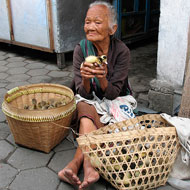
Risk map links deadly bird flu strain to live poultry markets
Areas with a high concentration of live poultry markets are at risk from a dangerous strain of avian influenza, H7N9, scientists say.
International researchers have warned that H7N9 could spread to new areas of India, Bangladesh, Vietnam, Indonesia and the Philippines.
A study published in Nature Communications links the emergence and spread of the disease to areas with a high concentration of live poultry markets.
Another factor contributing to the initial emergence of the disease was found to be “wetland-related” agriculture near the markets, such as farms raising ducks in flooded rice fields.
According to researchers, H7N9 does not appear to be linked to the growing number of intensive commercial poultry operations in China.
The first human case of H7N9 in China was reported in March 2013. Within one month, 126 cases and 24 deaths has been reported to the World Health Organisation. In January this year, an upswing in the number of cases was again reported. To date, there have been 429 cases and at least 100 deaths.
The research team comprised scientists from Oxford University, the International Livestock Research Institute (ILRI), the Chinese Center of Disease Control and Prevention and the the Universite Libre de Bruxelles (ULB).
A “risk map” developed by the team pinpoints parts of Asia with a high density of live bird markets. It is believed these could allow H7N9 to spread.
At risk areas include urban parts of China where the disease has not yet been seen, as well as large areas of the Bengal regions of Bangladesh and India, the Mekong and Red River deltas in Vietnam and isolated part of Indonesia and the Philippines.
“We're not saying these are areas where we expect to see infections emerge, but the concentration of bird markets makes them very suitable for infection should the virus be introduced there, and that knowledge could help guide efforts to limit transmission,” explained lead author Marius Gilbert from ULB.
Co-author Tim Robinson from the ILRI said the research will allow disease surveillance to be targeted at the most at risk areas, giving advanced warning should the virus spread.
The research also offers an insight into measures that could be put in place to limit further disease transmission. Certain factors were found to influence the spread of H7N9, including sanitation measures, “rest days” and the length of time birds spent at the market.
However, researchers note that despite “remarkably strict control efforts” in China, H7N9 has continued to spread to new areas, proof that the virus is “difficult to contain along poultry market chains”.
Click here to read the research paper in Nature Communications.
Image courtesy of ILRI/Chris Jost.



 The Veterinary Medicines Directorate (VMD) is inviting applications from veterinary students to attend a one-week extramural studies (EMS) placement in July 2026.
The Veterinary Medicines Directorate (VMD) is inviting applications from veterinary students to attend a one-week extramural studies (EMS) placement in July 2026.